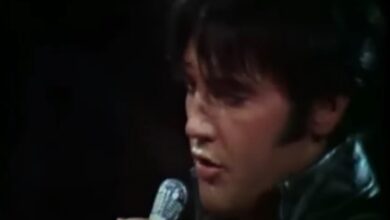The Heartfelt Duet “Don’t Cry Daddy” By Elvis And Lisa Marie Presley Might Move You To Tears
“Don’t Cry Daddy” is a poignant country ballad that evokes deep emotions through its heartfelt narrative. Originally recorded by Elvis Presley in 1969, the song quickly became a staple in his repertoire. Written by Mac Davis, the lyrics tell the story of a father who is attempting to soothe his children in the wake of their mother’s passing. This narrative not only captures the essence of grief but also layers in a message of resilience and the enduring strength of family bonds. The delivery of the song by Presley, who was known for his dynamic and emotive singing style, transformed it into a standout piece that resonated with audiences across the globe.
Elvis Presley, often referred to as the King of Rock ‘n’ Roll, was born in Tupelo, Mississippi, in 1935. His career, which began in the mid-1950s, was marked by a series of groundbreaking recordings that blended various musical styles, including rock and roll, pop, blues, and country. Presley’s influence on the music scene was unprecedented, helping to shape the landscape of modern music while breaking down racial barriers. His ability to interpret songs with profound emotional depth made him a beloved figure in multiple genres, and “Don’t Cry Daddy” is a notable example of his versatility.
In exploring the relationship between Presley and country music, “Don’t Cry Daddy” serves as a striking illustration of how the artist embraced and contributed to this genre. While often celebrated for his rock and roll hits, Presley had a deep appreciation for the storytelling aspect inherent in country music. This connection is evident in the way he approached the emotional weight of “Don’t Cry Daddy,” imbuing the song with a sincerity that resonates with listeners. The track captures the vulnerable side of masculinity, portraying a father who, despite his own pain, seeks to comfort his children.
The poignancy of “Don’t Cry Daddy” and the universal themes of loss and hope it embodies found new life in a 1997 posthumous duet featuring Lisa Marie Presley, Elvis’s daughter. This digital collaboration was made possible by advances in recording technology that allowed for the seamless integration of her voice with her father’s original vocals. The fusion of their voices not only revitalized the song but also provided an intimate glimpse into the personal and familial ties that transcend generations. In this version, Lisa Marie’s contribution deepened the song’s narrative, transforming it from a mere lament into a touching conversation between a father and daughter, each reflecting on their shared experiences.
Lisa Marie Presley, born in 1968, has made her own mark in the music industry. Despite being the daughter of an iconic figure, she forged a path as a singer and songwriter in her own right. Karen’s involvement in the duet was a profound homage to her father’s legacy, enabling her to express her feelings and memories associated with the song. It is emblematic of the unbreakable bond that exists within families, particularly as they navigate the complexities of loss and love. Her participation in the duet also resonated with fans, many of whom may have experienced similar familial tragedies, connecting them even more deeply to the music.
The collaboration also demonstrates the capabilities of modern technology to enhance musical experiences. The intricate processes involved in layering Lisa Marie’s voice over Elvis’s original track highlight not only the artistry of sound engineering but also the dedication to preserving musical authenticity. This level of detail ensured that the emotional integrity of the original song was maintained, while also allowing for a refreshing reinterpretation that brought a new dimension to the work.
Moreover, “Don’t Cry Daddy” stands as a testament to the timeless quality of music. The duet serves as a bridge between two eras, allowing listeners to engage with the classic sound of Elvis Presley while simultaneously experiencing the contemporary sense of loss articulated by Lisa Marie. The song exemplifies how music can connect people, evoke memories, and offer comfort in shared grief. It provides an opportunity for reflection on personal experiences, tying together the universality of human emotion through the lenses of two generations.
Ultimately, the posthumous duet of “Don’t Cry Daddy” is a powerful reminder of the enduring legacy of Elvis Presley. It speaks not only to the strength of the connection between a parent and child but also to the ability of music to endure through time and technological advancements. As listeners, we are gifted the opportunity to experience the depth of emotion that arises from such collaborations, continuing to feel the impact of Presley’s artistry while also recognizing Lisa Marie’s contributions as significant in their own right. The song’s narrative—rooted in loss, familial bonds, and the healing power of love—resonates as strongly today as it did at its inception, ensuring its place in the hearts of fans for years to come.
In conclusion, the journey of “Don’t Cry Daddy” from its initial release to the poignant duet featuring Lisa Marie Presley exemplifies the lasting power of music. It unifies past and present, echoing the themes of love and resilience that are fundamental to the human experience. The song transcends mere entertainment, serving as a heartfelt reminder of the bonds that define us and the memories that shape our lives, proving that music can be both a source of comfort and a vessel for connection across time.





